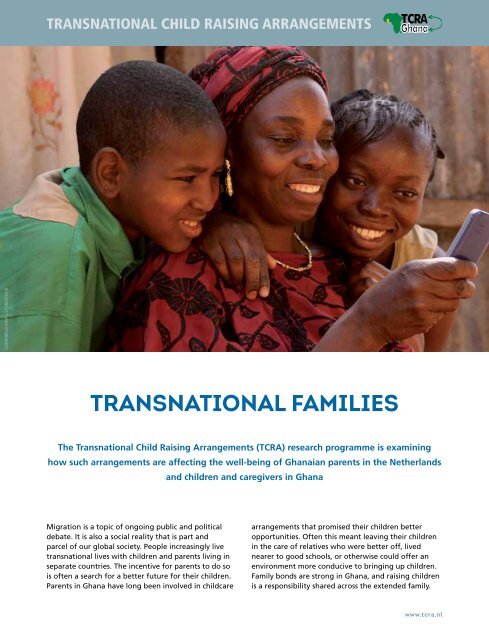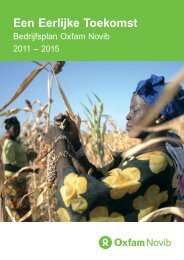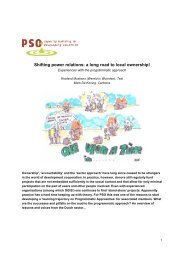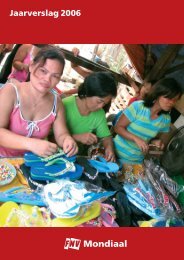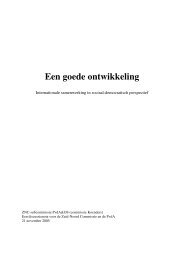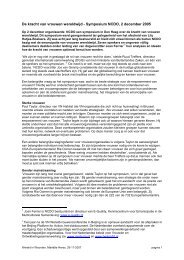TRANSNATIONAL FAMILIES - Wereld in Woorden
TRANSNATIONAL FAMILIES - Wereld in Woorden
TRANSNATIONAL FAMILIES - Wereld in Woorden
- No tags were found...
Create successful ePaper yourself
Turn your PDF publications into a flip-book with our unique Google optimized e-Paper software.
<strong>TRANSNATIONAL</strong> CHILD RAISING ARRANGEMENTSCOMMERCEANDCULTURESTOCK<strong>TRANSNATIONAL</strong> <strong>FAMILIES</strong>The Transnational Child Rais<strong>in</strong>g Arrangements (TCRA) research programme is exam<strong>in</strong><strong>in</strong>ghow such arrangements are affect<strong>in</strong>g the well-be<strong>in</strong>g of Ghanaian parents <strong>in</strong> the Netherlandsand children and caregivers <strong>in</strong> GhanaMigration is a topic of ongo<strong>in</strong>g public and politicaldebate. It is also a social reality that is part andparcel of our global society. People <strong>in</strong>creas<strong>in</strong>gly livetransnational lives with children and parents liv<strong>in</strong>g <strong>in</strong>separate countries. The <strong>in</strong>centive for parents to do sois often a search for a better future for their children.Parents <strong>in</strong> Ghana have long been <strong>in</strong>volved <strong>in</strong> childcarearrangements that promised their children betteropportunities. Often this meant leav<strong>in</strong>g their children<strong>in</strong> the care of relatives who were better off, livednearer to good schools, or otherwise could offer anenvironment more conducive to br<strong>in</strong>g<strong>in</strong>g up children.Family bonds are strong <strong>in</strong> Ghana, and rais<strong>in</strong>g childrenis a responsibility shared across the extended family.www.tcra.nl
This cultural phenomenon has taken on a newdimension with the migration of Ghanaian parentsto Europe. Some manage to br<strong>in</strong>g their childrenwith them, but most choose or are forced to leavetheir children beh<strong>in</strong>d. They are cared for by relativesor sometimes paid caregivers. The effect of thesemodern-day arrangements on migrant parents andon children and caregivers <strong>in</strong> Ghana is the focus ofthe Transnational Child Rais<strong>in</strong>g Arrangements (TCRA)research programme, an <strong>in</strong>terdiscipl<strong>in</strong>ary programmejo<strong>in</strong>tly coord<strong>in</strong>ated by Valent<strong>in</strong>a Mazzucato andTakyiwaa Manuh, professors at Maastricht University<strong>in</strong> the Netherlands and the University of Ghana,respectively. The programme also looks at the<strong>in</strong>stitutions that shape TCRAs: schools and foster<strong>in</strong>garrangements <strong>in</strong> Ghana, and family migration laws <strong>in</strong>the Netherlands.Academically, the TCRA programme has developednew methods for migration studies as well as a betterunderstand<strong>in</strong>g of transnational family relationships(see ‘Methodology’ box). The relevance of theprogramme to a country’s development lies <strong>in</strong> theknowledge it creates about how migration impactsfamilies, through the well-be<strong>in</strong>g of migrants overseas,and their children, who <strong>in</strong> the future will be taskedwith the development of their countries.CHILDREN: A STABLE HOMEThe effects of TCRAs on children who have stayedbeh<strong>in</strong>d <strong>in</strong> Ghana are researched by look<strong>in</strong>g at theiremotional well-be<strong>in</strong>g, health status and educationalperformance. Nearly one out of every six children(16%) <strong>in</strong> Ghana’s urban centres has one or bothparents liv<strong>in</strong>g abroad. If both parents are abroad,children are often left <strong>in</strong> the care of a maternalrelative. Migration of one or both parents does notneed to result <strong>in</strong> negative outcomes for these children.‘Children’s well-be<strong>in</strong>g will impactpositively on society as a whole.M<strong>in</strong>istries and schools <strong>in</strong> Ghanashould therefore pay moreattention to caregivers,who carry a huge responsibility’- Takyiwaa Manuh -SCHOOLSObservations from teachers <strong>in</strong> Ghanaian secondaryschools about children whose parent(s) live abroad:– Some children who migrated with their parentsare sent back to Ghana to get ‘re-educated’ afteradopt<strong>in</strong>g <strong>in</strong>appropriate behaviour while abroad.– These children f<strong>in</strong>d it hard to adapt to Ghanaiandiscipl<strong>in</strong>ary standards and challenge teachers’ andcaregivers’ authority.– There is no consistent evidence that TCRA childrenwho never lived abroad with their parents behavedor performed poorly.– Underperformance is due to emotional issues ora lack of supervision of schoolwork. Caregiversgenerally do not attend parent–teacher meet<strong>in</strong>gs.– Some children need special counsell<strong>in</strong>g services,but these services are currently offered only toa limited extent.– Some parents, despite the geographical distance,keep <strong>in</strong> close contact with teachers about theirchildren’s performance and progress.The most important factor is a stable and secure carearrangement. If children are transferred from onecaregiver to another more than once dur<strong>in</strong>g theirparents’ absence, this tends to impact negatively ontheir self-reported emotional well-be<strong>in</strong>g and healthas well as on their school performance. A positiverelationship with the migrant parent overseascontributes to their overall well-be<strong>in</strong>g.PARENTS: MONEY AND MOBILITYMany Ghanaian parents <strong>in</strong> the Netherlands have oneor more children cared for back <strong>in</strong> Ghana. Often, Dutchmigration laws leave them with no other option thanto be separated from their children. Other parentsvoluntarily leave their children beh<strong>in</strong>d. They want theirchildren to be exposed to the Ghanaian culture andlanguage, and value the more discipl<strong>in</strong>ed attitude atschools <strong>in</strong> Ghana. Moreover, it enables parents to focuson their work and earn a good liv<strong>in</strong>g, which is why theyleft their country and family <strong>in</strong> the first place.How does the separation affect the parents’ well-be<strong>in</strong>g?The research suggests that parents who live withouttheir children are worse off emotionally and health-wisethan those who have their children nearby. Interest<strong>in</strong>gly,
Secondary school students <strong>in</strong>Ghana fill out a survey for theTransnational Child Rais<strong>in</strong>gArrangements (TCRA) programme.The programme <strong>in</strong>vestigateshow transnational child-rais<strong>in</strong>garrangements affect not only thewell-be<strong>in</strong>g of children who rema<strong>in</strong><strong>in</strong> the country of orig<strong>in</strong>, but alsotheir migrant parents and theircaregivers.ERNEST APPIAHit is not the separation as such that causes this negativeimpact; rather, it is the fact that their earn<strong>in</strong>gs and legalstatus <strong>in</strong> the Netherlands do not allow them to sendenough money home, keep <strong>in</strong> close contact, returnhome regularly or br<strong>in</strong>g their children over for shortvisits. Tensions can also arise <strong>in</strong> the parent–caregiverrelationship when remittances are lower than expected,with consequent worries about the care their childrenreceive. Documented migrants who earn more are lesslikely to experience problems <strong>in</strong> the care arrangementbecause they have the ability to visit home and makechanges to the care-giv<strong>in</strong>g arrangement when necessary.In other words, the migrant parents’ economic andlegal status – or money and mobility – have a strongimpact on the quantity and quality of transnationalcare, and by implication, on the well-be<strong>in</strong>g of both theparents and the children.METHODOLOGYThe TCRA research programme exam<strong>in</strong>es how TCRAsaffect children who rema<strong>in</strong> <strong>in</strong> the country of orig<strong>in</strong>, theircaregivers <strong>in</strong> Ghana and their migrant parents <strong>in</strong> theNetherlands. The research is unique <strong>in</strong> that it uses theSimultaneous Matched Sample method to <strong>in</strong>clude all theactors <strong>in</strong> both countries.The programme employs quantitative and qualitativemethods (e.g. a survey among 2760 school children <strong>in</strong>Ghana and 300 parents <strong>in</strong> the Netherlands; <strong>in</strong>-depth<strong>in</strong>terviews with 54 school children, 30 teachers and20 caregivers <strong>in</strong> Ghana) and ethnographic case studiesthrough which the children, caregivers and parents of15 matched sample TCRAs are followed over a 2-yearperiod.The programme’s focus on Africa is an importantcontribution to the exist<strong>in</strong>g literature, which looks ma<strong>in</strong>lyat transnational families from Asia and Lat<strong>in</strong> America,where different family norms prevail.www.tcra.nl
MIGRATION AND FAMILY REUNIFICATIONAccess to the formal labour market and the possibilityto travel between countries are important factors <strong>in</strong> theproper function<strong>in</strong>g of TCRAs.‘People migrate, if not legally then illegally,’ saysValent<strong>in</strong>a Mazzucato, co-coord<strong>in</strong>ator of the TRCAprogramme. ‘Most Ghanaian undocumented migrants<strong>in</strong> the Netherlands work. Policies need to recognizethat our economy needs these people and must createconditions for them to work legally. They would paytax, be protected by labour laws, and be able to travelto visit their children or have their children visit themhere.’The assumption that all parents want their childrento live with them <strong>in</strong> the Netherlands is false.‘Reunification,’ Mazzucato says ’is needed mosturgently by parents fac<strong>in</strong>g problematic child-rais<strong>in</strong>garrangements. And they are often the ones whoare undocumented or occupy low-level jobs. If theirsituation was more secure, they might well prefer theirchildren to stay <strong>in</strong> Ghana, where the secondary schoolsystem is considered to offer their children betteropportunities.’CAREGIVERS: WHO IS IN CHARGE?In Ghana, it is culturally acceptable to leave one’schild <strong>in</strong> the care of a family member or close relation.In fact, there are many positive values associated withfoster<strong>in</strong>g. Traditionally, the chosen caregivers werefully <strong>in</strong> charge of the child’s life. They wereresponsible both f<strong>in</strong>ancially and emotionally forthe child’s well-be<strong>in</strong>g. The recent transnationalarrangements work differently. Migrant parentstravel abroad with the prospect of earn<strong>in</strong>g moneyand provid<strong>in</strong>g a better future for their children. Whileaway, they rema<strong>in</strong> responsible for their children’smaterial well-be<strong>in</strong>g. They send money for their dailyupkeep and school fees. In exceptional cases, theyeven pay the caregiver.But an irregular or <strong>in</strong>sufficient flow of remittancesmay give rise to tensions. The caregiver becomesoverburdened and the child, unaware of the parent’ssituation, may blame the caregiver. There is anothersource of stra<strong>in</strong>: the regular contact that is possibletoday – through telephone, email, Facebook andSkype – between parents abroad and their children athome can underm<strong>in</strong>e the caregiver’s authority. Indeed,parents <strong>in</strong> the studied TCRAs exert <strong>in</strong>fluence over theirchildren’s upbr<strong>in</strong>g<strong>in</strong>g while the children – who areencouraged by their parents to spend maximum timeat school and do<strong>in</strong>g homework – are of little practicalhelp to their foster parents. When mutual expectationsbetween the parents and the caregivers are not met,conflict and distrust may arise. This is exacerbatedwhen children – truly or falsely – report the misuseof remittances by the caregiver to their parents. Thissituation is stressful for both parties and difficult toresolve due to the geographical distance.THE RESEARCHThe TCRA programme is funded by NWO–WOTROScience for Global Development and coord<strong>in</strong>atedby Maastricht University, the Netherlands (Valent<strong>in</strong>aMazzucato) and the Centre for Migration Studies at theUniversity of Ghana (Takyiwaa Manuh and MariamaAwumbila). Researchers <strong>in</strong>clude Bilisuma Bushie Dito,Miranda Poeze, Ernest Nimfah Appiah, Victor Cebotari,Ernest<strong>in</strong>a Korleki Dankyi and Djamila Schans. Theprogramme is conducted <strong>in</strong> close cooperation with theTCRAf-Eu programme funded by NORFACE. For more<strong>in</strong>formation visit the programme website: www.tcra.nlOpen source article: Mazzucato, V. and Schans, D. (2011)Transnational families and the well-be<strong>in</strong>g of children:Conceptual and methodological challenges. Journal ofMarriage and Family 73(4): 704–712.COLOPHONText: Ellen Lammers, WiW-global research & report<strong>in</strong>g,March 2013Production: Contactivity, LeidenEdit<strong>in</strong>g: Mark SpeerDesign and layout: Anita Weisz-ToeboschPr<strong>in</strong>t<strong>in</strong>g: Drukkerij Holland, Alphen a/d Rijn


